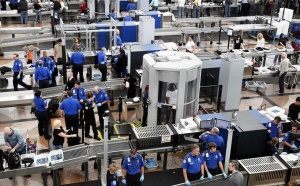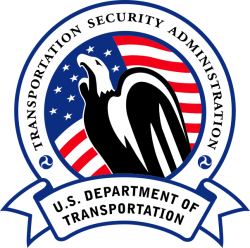TSA
 | |
 | |
| Parent organization | US/Department/Homeland Security |
| Headquarters | Pentagon City, Arlington County, Virginia |
| Leader | Administrator of The Transportation Security Administration |
| Staff | 55,600 |
| Subpage | •TSA/Administrator |
| Formed just after 9-11, this agencies conditions the citizenry to undergoing invasive control measures, best understood as "security theatre". Their competency can be measured by their requirement that travellers only use a locks which can be opened by a master key, that they posted images of online. | |
Contents
Official narrative
This agency makes people safer by checking for bombs or dangerous items aboard planes. Their right to require some passengers[1] submit to carcinogenic X-ray scanning has saved lived saved the concomitant decrease in attacks by "terrorists". Citizens should be glad that it plans to roll out such invasive checks across the travel system. The introduction of watch lists are not to prepare for a totalitarian control grid, but for passenger safety.
Problems
The procedure of the TSA (and similar agencies worldwide) are not backed up by evidence of their effectiveness at reducing terrorism. For example, the "liquid bomb plot" has never been shown to be possible and James Petras has termed it a "hoax"[2] while Nigel Wylde, a former senior British Army Intelligence Officer, termed the police and government story about the "terror plot" part of a "pattern of lies and deceit."[3]
Security theatre
Security expert Bruce Schneier describes the ban on liquids as "security theater"[4] i.e. something which is carried out for their impact on people's minds, rather than for the purpose of increasing 'security'.[5]
“The TSA claims it won't provide examples of such cases due to national security, but given its history of bragging about lesser successes, that's a little tough to believe. For instance, the agency bragged plenty about catching Kevin Brown, an Army vet who tried to check pipe bomb-making materials. Brown wasn't going to blow up the plane — the unfinished materials were in his checked luggage — but if the TSA publicized that, why wouldn't it publicize catching someone who was trying to blow up the plane? The Government Accountability Office is also skeptical that the TSA is stopping terrorists. It concluded in 2013 that there's no evidence the agency's SPOT program, which employed 2,800 as of the study and attempts to scan passengers for suspicious behavior, is at all effective. Only 14 percent of passenger flaggings by TSA officers led to a referral to law enforcement. Only 0.6 percent of TSA flaggings led to an arrest. None of those arrests were designated as terrorism-related.”
(17 May 2016) [6]
Increase in thefts
The TSA has been criticized for an increase in baggage theft after its inception.[7] In 2008 an investigative report by WTAE in Pittsburgh discovered that despite over 400 reports of baggage theft, about half of which the TSA reimbursed passengers for, not a single arrest had been made. The TSA does not, as a matter of policy, share baggage theft reports with local police departments.
95% Failure rate
In June 2015, CNN reported that the acting Administrator of The Transportation Security Administration, Melvin Carraway, was removed from the post and replaced by his deputy Mark Hatfield, after spectacularly bad performance (banned items were smuggled through the screening process in 67 out of 70 tests it conducted across the USA).[8] This led Bruce Schneier to argue in an article entitled "Why are We Spending $7 Billion on TSA?" that the inescapable conclusion is that "We don't need $7 billion worth of airport security. These results demonstrate that there isn't much risk of airplane terrorism, and we should ratchet security down to pre-9/11 levels."[9]
TSA-Approved locks
The TSA destroyed the luggage lock industry by creating a controlled dualopoly market where only two companies are allowed to manufacture “TSA Approved” luggage locks, which can all be opened by TSA master keys. The TSA posted images of a master key online, which allowed locksmiths to post a set of CAD files online which can be used to print master keys on any 3D printer.[7]
Related Document
| Title | Type | Publication date | Author(s) | Description |
|---|---|---|---|---|
| Document:Twenty Years On, We’ve Learned Nothing From 9/11 | Speech | 17 September 2021 | Ron Paul | 20 years on from 9/11, Ron Paul says that The Establishment in the United States has learned nothing since the attacks. |
References
- ↑ http://professional-troublemaker.com/2015/12/24/corbett-sues-tsa-over-new-policy-to-refuse-opt-outs/
- ↑ http://www.voltairenet.org/article143264.html
- ↑ http://911blogger.com/node/2984
- ↑ https://www.schneier.com/blog/archives/2008/04/the_liquid_bomb.html
- ↑ Schneier, Bruce (2003). Beyond Fear: Thinking Sensibly about Security in an Uncertain World. Copernicus Books. p. 38. ISBN 0-387-02620-7.
- ↑ http://www.vox.com/2016/5/17/11687014/tsa-against-airport-security Vox
- ↑ a b http://21stcenturywire.com/2015/09/14/tsa-buffoonery-security-chiefs-leave-image-of-luggage-skeleton-key-online/
- ↑ http://edition.cnn.com/2015/06/01/politics/tsa-failed-undercover-airport-screening-tests/index.html
- ↑ https://www.schneier.com/essays/archives/2013/07/mission_creep_when_e.html